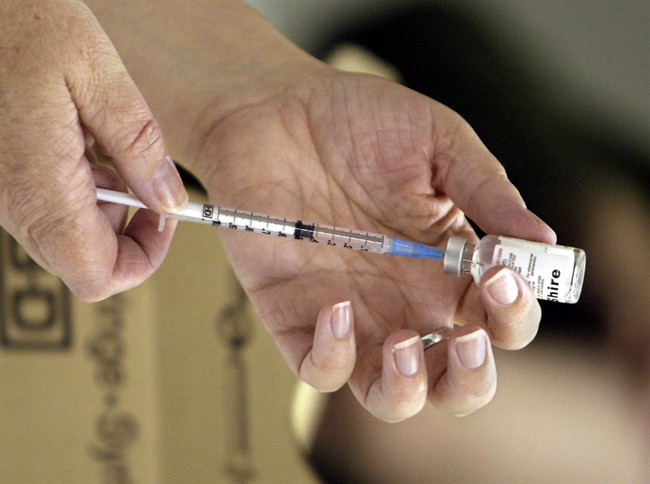While it didn’t work against this year’s H3N2 flu season, the seasonal flu vaccine may help protect against the H7N9 bird flu that emerged out of China, new research suggests.

American researchers say that the mismatched flu vaccine “neutralizes” H7 viruses and could be a promising tool in fighting against the bird flu that made international headlines in 2013.
“We have clear evidence that a normal immune response to flu vaccination offers protection against dangerous and highly unique strains of influenza such as H7N9. We now need to develop ways of amplifying this response,” Dr. Patrick Wilson, the study’s co-senior author, said in a statement.
Wilson and his team at the University of Chicago say that H7N9 has a mortality rate of about 30 per cent, which is unusually high for humans. While looking for potential candidates to fight the influenza, the scientists zeroed in on the flu vaccine.
READ MORE: Flu shot halves risk of heart attack or stroke in heart disease patients, Canadian study suggests
The vaccine triggers the immune system to produce antibodies – proteins that bind to and neutralize foreign invaders – against flu strains, but the researchers wanted to know if the flu shot also sparks production of antibodies against rare flu strains.
They picked out 83 antibodies – isolated from 28 vaccinated patients – that reacted with H3N2. When tested, seven per cent of the antibodies reacted against H7 strains, even though these viruses aren’t included in the vaccines the patients received.
Three of these antibodies appeared to “completely neutralize” the H7N9 avian flu. The researchers conducted a similar test with mice – treating them with the same antibodies before exposing them to a lethal dose of H7N9. Turns out, the antibodies stopped death in the rodents.
“It appears more common than previously thought for antibodies induced by flu vaccination to offer cross-protection against H7N9. Although they are not always protective, H7-reactive antibodies can be found in almost everyone that’s been vaccinated,” Dr. Carole Henry, a study author, said.
READ MORE: Flu vaccine only 23 per cent effective this season, CDC says
It’s still unclear why these antibodies are created and in lower doses. The scientists hope to better understand the process, and create a larger scale response so that vaccines can offer broad protection against influenza strains.
“For now it’s clear that seasonal flu vaccination provides defense against more than just common strains. Everyone should be vaccinated,” Wilson said.
The team’s full findings were published in the Journal of Clinical Investigation. Read the study here.
This year’s flu vaccine mismatch meant that the flu shot was only effective about 23 per cent of the time in North America, among one of the worst results recorded since doctors began tracking how well the vaccines work.
In Europe, the mismatch meant the shot only protected about three per cent of those who got vaccinated, according to British health officials.
READ MORE: The flu vaccine didn’t work in Europe either
Western countries, more or less, use the same vaccine – there are only miniscule variations by product and manufacturer.
H3N2 was this year’s flu season culprit – health officials anticipated an H3N2 strain but it drifted and didn’t match what was in the vaccine.
Each year, strains of the influenzas mutate and re-emerge, infecting victims and triggering a new season. Those of us in the northern hemisphere keep a watchful eye over the flu in the southern hemisphere, which affects residents during their winter (or our summer).
READ MORE: Nasty flu season strikes as H3N2 cases spike across Canada
Scientists look at the patterns and make their predictions based on what viruses made their rounds below us and estimate what mutations could occur before the influenzas make their way over the equator.
Read more about who should be vaccinated here.
carmen.chai@globalnews.ca
Follow @Carmen_Chai




Comments